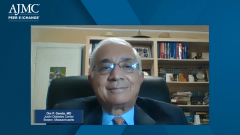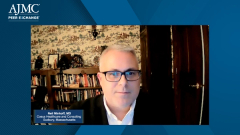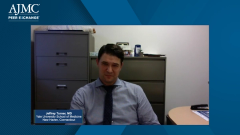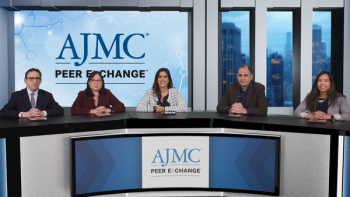
Future of Cardiorenal Metabolic Syndrome Management
Jeffrey Turner, MD; Nihar R. Desai, MD, MPH; and Om P. Ganda, MD, provide closing thoughts on the future of cardiorenal metabolic syndrome management.
Episodes in this series

Neil Minkoff, MD: I would like to give each of you a chance to leave us a parting thought or words of wisdom. Dr Turner?
Jeffrey Turner, MD: SGLT2 inhibitors are a gateway toward better things to come. I’ll say that from a nephrology standpoint because over the course of decades, we’ve had very few drugs that were beneficial. We’ve talked about the GLP-1 agonists; there are new classes of mineralocorticoid receptor antagonists coming online that show cardiovascular and renal benefits. I think there’s going to be more drugs like SGLT2s to come in the not-so-distant future that are going to make an impact on people’s health outcomes. What we’re going to have to start appreciating is—I think Dr Desai talked about the 4 pillars—what’s the maximum number of pillars we should have? Seven pillars? Eight pillars? Are patients going to tolerate being on 8 different drugs that have all been proven to have mortality benefit in their particular disease? That’s going to be the next stage to come in the next decade or two as more and more of these drugs come online.
Neil Minkoff, MD: Dr Desai?
Nihar R. Desai, MD, MPH: This was a terrific discussion, and I hope that it was enjoyable for the audience. There’s so much excitement right now. There’s so much evidence. The guidelines are changing, and it seems like every week and every month, there’s a new paper or article coming out about the benefits of these drugs. I hope we all take it upon ourselves to say that those drugs can only have benefit if we prescribe them, come together as a care team, and are committed as clinicians and professionals to get them to the patients who need them. It’s a call to action for all of us to say, “What do we do with these data? What do we do with this evidence? How do we align our clinical practice with the evidence that we see accumulating out there?”
Neil Minkoff, MD: Dr Ganda, I’ll give you the last word.
Om P. Ganda, MD: We are in an exciting new era that we have never seen before. This is like the discovery of insulin 100 years ago. We’re looking at diabetes as a disease where we can not only treat it with various medications effectively, but we can actually prevent the burden of complications leading to mortality. With these new drugs, we are now seeing effects on mortality, which was never seen before with any other drug. We have made a lot of progress with lipids and blood pressure, but this is an exciting new era, and we will get the dividends. I’m optimistic based on everything we’ve talked about today. It was nice to have this session, and hopefully many people will send their thoughts and apply some of the knowledge. Such sessions are important. Thank you.
Neil Minkoff, MD: Well, I would like to thank all of you for participating and being such robust panelists. I would like to thank everybody in the audience who came in and has been with us for this. We all hope that you found this enlightening and educational the way I did, and I hope you found this American Journal of Managed Care® Peer Exchange to be informative. Thank you.
Transcript edited for clarity.
Newsletter
Stay ahead of policy, cost, and value—subscribe to AJMC for expert insights at the intersection of clinical care and health economics.









